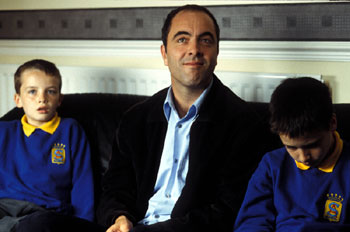Millions review by Cinema Guru Boy
Of all the Danny Boyle films I've seen, there is not a single family-friendly plot. Not even anything that can possibly be done tastefully. We have flesh-eating zombies (whether Boyle will admit it or not), a paradise island with an endless supply of marjuana plants, a herion junky trying to go cold turkey and three friends whose dead roomate's stash leads to greed and jelousy. Okay, so maybe a stupid screwball comedy about a hostage situation that leads to a romance could've been done in a family-friendly manner, but not the others. However, Danny Boyle appearently attempts to widen his fan base my making Millions, an endearing Christmas film about children.The thing those other five films (that's 28 Days Later, The Beach, Trainspotting, Shallow Grave, and A Life Less Ordinary, respectively, for those keeping score at home) do have in common with this film is their sence of fantasy. Millions is first and foremost a fantasy, shown through the mind of Damien (Alexander Nathan Etel), a boy of about eight years of age. The boy has an active imagination, and everything from his view of his cardboard fort in the middle of a field to his imaginary conversations with various Catholic saints are illustrated so artistically, Boyle has proven to not have lost his edge, even if this a family film. The plotline begins when Damien is hanging out in his cardboard fort and seemingly out of nowhere, a dufflebag full of cash crashes through his paper-thin walls. Since he's on such good terms with the saints, Damien assumes God Himself has delivered it for Damien to do good and work toward sainthood himself. Damien's older brother Anthony (Lewis Owen McGibbon), however, has other ideas and sees an opportunity for selfishness and greed. These boys' chemistry is priceless. They work so well off each other and play into the story so well. One of the film's running jokes is their very adult vocabulary. These young actors' deliveries is what makes the punchline so successful.
The boys are being raised by their caring, but paternally overwhelmed father, Ronnie (James Nesbitt, possibly best known on this side of the puddle from Waking Ned Devine). Having been thrown head-first into the parenting pool because of his wife's, or the boys' mother's, death, he narely has time to grieve himself, knowing he has two boys who need him more now than ever. There's a very poingient moment in which Ronnie is found sleeping while spooning with a set of pillows to compensate for his wife's physical presence. However, the deceased mother angle could've been an entrance to a weepy melodrama, but this film handles it delicately, never to fall into anything too sugary, but still casts a morose shadow over the characters.
Soon, as the money corrupts the boys when they find out they have to spend it by the new year, when England chnges its currency from Pounds to Euros. While Damien keeps trying to help people by taking street people to Pizza Hut or donating it to charity, Anthony uses it to gain respect from the kids at school. On their way to school, Anthony is picked up by some classmates, acting as his secret service, which draws a parallel to his selfishness. With the one brother becoming more and more likable and the other becoming less and less likable, this is great strorytelling.
However, there is a lot of extremely obvious product placement here, and while this may not bother other folks, this does bother me. They made a direct point of featuring all the aspects of Pizza Hut when treating the street people. And the dufflebage full of cash? Every shot of it, which was aplenty, treated us to our own mini-commercial of Nike, as it displayed hat prominent swoosh. With as talented an artist as Boyle is, this just kind of shoots down his street cred as an artist.
However, that doesn't make or break the story, There is so much great visualization whenever a story is told by a character, especially the child in the school bathroom who tells the brothers where the money really came. Which brings in the creepy stalker. Bringing in this device finally poses a physical threat, whereas the conflict was a moral question leading up t this point. One of the robbers of the cash knows the boys have and wants it back. This was nice to put a face on the second act, rather than just being a man vs. himself story. However his resolution was a real cop-out amd just seemed to easy.
One thing I started asking myself by the end of the film is whether it was realistic whether money would create such black-and-white reactions to it, as Anthony respresented the black and Damien the white. Then I thought, does it matter? This is fantasy. Just like all of Trainspotting's fantasy sequences and the entire film of 28 Days Later, both of which were great films. A film about a young boy and his imagination should not be judged on realism.






6 out of 10 Jackasses blog comments powered by Disqus
